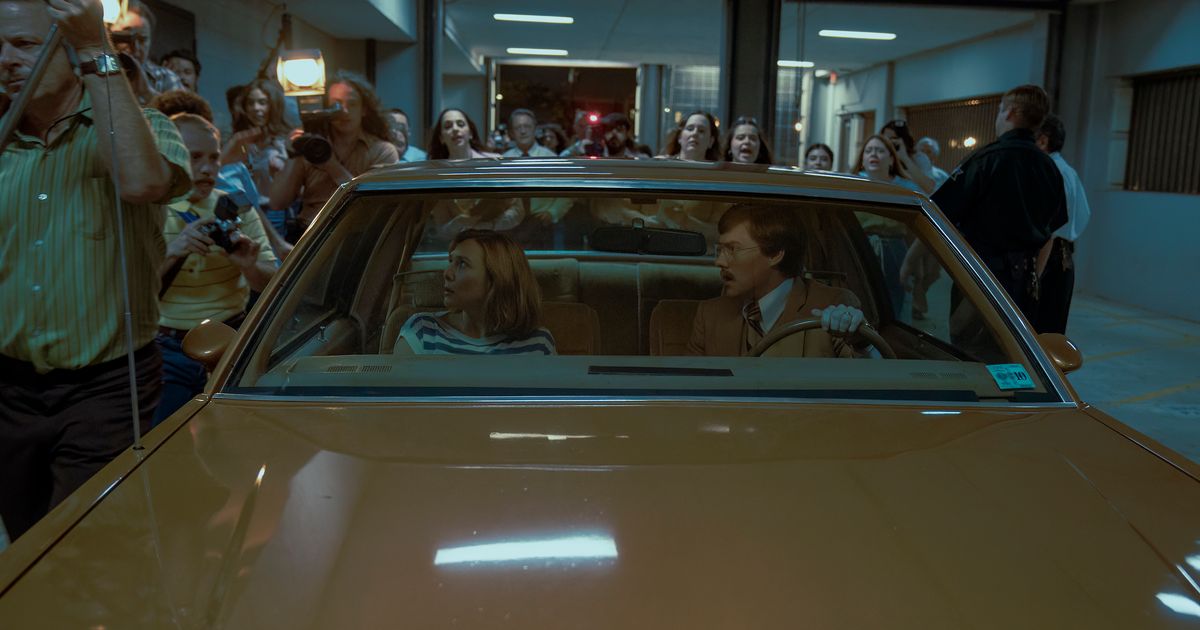
Love & Death Recap: Media Circus
Season 1 Episode 6 Editor’s Rating2 stars **
Photo: Jake Giles Netter/HBO/JGN Love & Death’s entry into the courtroom feels like the time the show should start pulling together its dramatic threads, tying them into the single purpose of exploring Candy Montgomery’s normal-looking but deeply disturbed world. But “The Big Top,” the penultimate episode of the miniseries, feels more diffuse than ever, an appropriately circusy menagerie of points already made and developments that sometimes feel as if they’re coming from nowhere in particular. There’s a fine line between observing the unknowable and making your audience actively wonder why this show exists.
From the seen-this-before files, there’s the episode’s opening, with Candy cooking more eggs, again singing along to the radio in a state of eerie distraction, driving home her tendency to simultaneously retreat into domesticity and seemingly visit another world within that domestic sphere when things are going bad. Restyled according to Don’s specifications to even more closely resemble a Normal Housewife of Mid-1980, Candy is preparing for the commencement of jury selection when she’s visited by Sherry, who has felt like something of a non-character for much of the series — a real feat for someone played by Krysten Ritter! Sherry’s encouragement doesn’t move the needle much for Candy, who confesses discomfort at her newfound dependence on other people. On the way to the courthouse, she asks one of her lawyers what Texas prisons look like; he assures her that of the two women’s prisons, she would only be bound for the “good” one if she’s found guilty. “I don’t think I can do this,” she says when they reach their destination. “Yes, you will,” he says, and it’s indicative of this episode’s elusiveness that I wasn’t sure whether this grammatical mismatch was intentional. (It must be, right? But why? Is it connected to the way Candy tells her daughter that a particular conversational thread is “not appropriate dinner talk at the table”? What is this flouting of parallelism and modifier placement telling us?!)
At jury selection, a still-cocksure Don makes a startling announcement that, oh, yeah, Candy totally did kill Betty. It was self-defense, though! Stay tuned for more, he promises! Because Candy herself will be taking the stand! It’s a showboating preview disguised as close-to-the-vest modesty and introduces some more who-me hype into the trial, which will shortly cause additional friction with Judge Ryan. The proper trial kicks off with Don immediately absorbing contempt-of-court jail time (to be served after the trial’s completion) for violating the judge’s gag order — and responding with, yes, genuine contempt when Ryan tries to dress him down, accusing the judge of his own hypocritical fame-courting. It’s a tensely funny scene, but like a lot of Don’s scenes in these later episodes, it’s somewhere between repetitive and inexplicable: We’re to understand that this small-town non-trial lawyer is suddenly preening from all the sudden attention, but not really given enough information to tell whether his frustration with Judge Ryan is justified. There’s clearly hubris at work here, but the show is coy about how much.
Despite Don’s shenanigans, the trial seems to go pretty well for Candy, particularly when the prosecution calls Allan to the stand. His plainspoken answers to the defense’s questions about Betty’s agitated state and general depression, as well as the nature of his affair with Candy (in his telling, uh, pretty chill) and the location of the murder weapon (Candy didn’t know that there was an ax in the garage), make him seem like, well, a defense witness. Again, the show’s dispassionate gaze turns murky: When confronted by Betty’s father after his testimony, Allan just says that he had to be honest and — in a weirdly chilly response to Betty’s father asking him whether Betty’s death bothers him — that “we weren’t getting along too well.” Is he indicating a sickly, guilty relief at Betty’s death? Fair enough if that’s the ambiguity Love & Death is attempting to toy with, but despite the occasional pointed bits of discomfort (like Candy’s daughter asking after Betty and Allan’s daughter last week), some of this feels like it’s taking place in a vacuum. After initially seeming numb with grief (and terrified of the idea that Betty might have taken her own life), Allan now comes across as just plain numb and, weirdly, like a childless man, though maybe that’s just a boomer dad for you.
Or maybe this is the show’s misguided attempt to imitate Candy’s vaguely narcotized state. Most of the trial seems to favor her, but the sheer volume of wounds on Betty’s body and blood at the crime scene makes Candy’s “40 whacks” of self-defense seem dubious. In other words, the outcome may well depend on the jury’s personal opinion of Candy, which is why Don is so frustrated about her Serax intake. The drug, a brand-name version of Oxazepam, calms Candy’s nerves and renders her exterior perfectly opaque — exactly what Candy wants and what her lawyers are afraid of. “If you look shut down and robotic,” Don says, “you go to jail.” He warns Candy to get off the drug, but she seems to keep taking it anyway, and when the prosecution rests, it’s her turn on the stand, much to Don’s horror. He tries to delay until the next day, but to no avail; Judge Ryan gives him ten minutes. The camera pushes past the rest of the court, making all the other figures look like figures in a diorama, on its way to fix on Candy’s face as her ten-minute reprieve ticks by. The episode ends in that close-up, as Candy looks into the camera but doesn’t break her lack of expression. She’s poised on the brink of self-exposure, just as this episode feels frozen on the precipice of dark comedy, too zonked to take a leap.
Love Notes
• Soundtrack watch: Needle-drop bookends: Candy sings along to “The Love Lost” by Harold Melvin & the Blue Notes in the opening, while “Dance to the Music” by Sly and the Family Stone provides an uninspired ironic counterpoint over the end credits.
• Candy’s daughter reports that one of her classmates wants to go as Candy for Halloween. It seems a little young for wry, knowingly campy current-events-commentary costumes, but hey, there weren’t that many slasher movies yet in Halloween 1980, so what’s a kiddo in search of a transgressive costume supposed to do?
• As the trial ramps up, supporting characters are drawn in: Betty’s father, Bob Pomeroy (Matthew Posey), in town to watch the trial; Jackie (Elizabeth Marvel), Candy’s former pastor, who is incensed that Candy lied to her (though Candy insists that claiming not to have murdered Betty Gore is the truth); and Candy’s current pastor, Ron, is pressured by Don to speak to the press about Candy’s virtue.
VULTURE NEWSLETTER
Keep up with all the drama of your favorite shows!This site is protected by reCAPTCHA and the Google Privacy Policy and Terms of Service apply. Vox Media, LLC Terms and Privacy Notice
<
p aria-hidden=”true”>By submitting your email, you agree to our Terms and Privacy Notice and to receive email correspondence from us.
































![iFi's GO Bar Kensei Dongle DAC Supports K2HD Technology With Some Samurai Swagger [Updated] iFi's GO Bar Kensei Dongle DAC Supports K2HD Technology With Some Samurai Swagger [Updated]](https://i0.wp.com/cdn.ecoustics.com/db0/wblob/17BA35E873D594/33FF/45A11/QTXOLJR4xDKSNMMk2WlTgjaIlvSgcYpeU1xJzUwIoYs/ifi-go-bar-kensei.jpg?w=768&ssl=1)
























